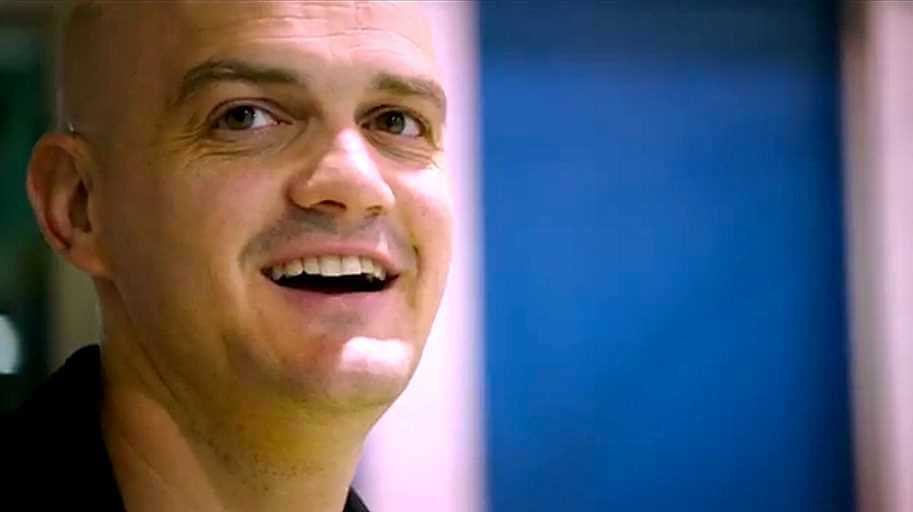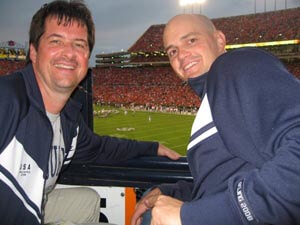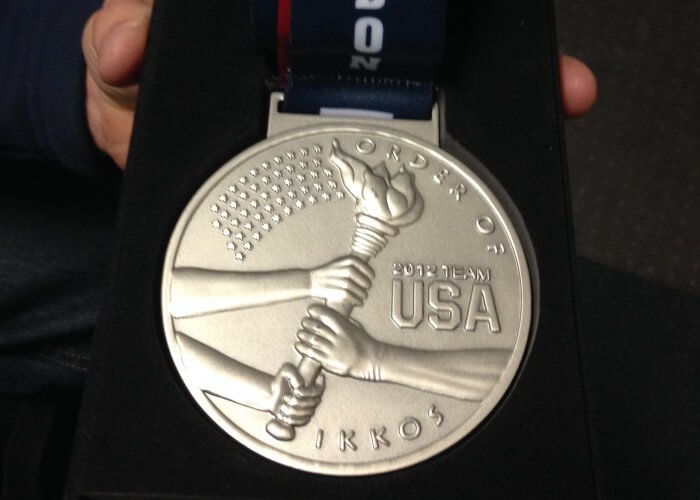Dave Denniston: It’s Not About The Swimming Moments For Paralympic Coach

By James Bossert, Swimming World College Intern
When our alarm clock goes off at 5:30 am every morning, we typically groan and wonder why in the world we are waking up so early. Not Dave Denniston, coach of the U.S. Paralympic Resident Swim Team at the United States Olympic Training Center.
“These athletes are why I wake up early and come back day after day.”
The athletes he is referring to are the resident athletes that train at the Olympic Training Center in Colorado Springs, Colo. At any point in time, the team ranges in size from five to 10 athletes. Denniston swam on the resident team and represented Team USA at the Beijing Paralympic Games in 2008.
I accidently called them “kids” while talking with Dave, but I quickly corrected myself which brought a smile and a quick laugh from him.
“You’ll notice how I call them all athletes, they aren’t kids. They still are professional athletes and they deserve to be treated that way.”
Paralympic athletes might not always look like a Michael Phelps or a Natalie Coughlin, but their training is not much different. There are some swimmers that are sprinters, some that swim middle distance and distance freestyle and the swimmers that specialize in breaststroke, butterfly or backstroke.
“I still train them specifically for their events. Of course we do the traditional practices where we get our yardage work in, but the training isn’t different. You learn how to adapt the training for each athlete’s classification. Usually that’s just an interval or a timing adjustment.”
“For example, we have two dwarfs that do about 60-70% of what some of the other athletes do. But it is still the same basic framework.”
“They aren’t competing for hugs, as we say. They want gold, they want to win. As a coach, we are just trying to keep that fire and passion engaged.”
Through his practices, Denniston is trying to keep the swimmers engaged.
“That’s really why coaches are there. To help fuel each athlete’s passion and fire for winning.”
If you don’t want to watch the workout you give your athletes, they probably don’t want to do it either – Dave Salo
When I asked him about how he keeps his athletes engaged during practice he quoted Dave Salo, the head coach at the University of Southern California, saying “’if you don’t want to watch the workout you give your athletes, they probably don’t want to do it.’ If I put forth a practice that is engaging, challenging and fun, both for me and for the athletes that’s how I help them along with their goals.”
Denniston started coaching the resident team in February 2010, after former Paralympic coach Jimi Flowers died in a hiking accident in the Colorado Mountains on July 10, 2009.
He remembers back to a meet up in Canada, a month after Jimi had passed away.
“I remember not caring how the meet went. I didn’t care if I swam well, I didn’t care if I swam poorly. I had kind of done everything that I wanted to in the pool. It also just wasn’t the same without Jimi on deck. I looked around to my teammates and the other coaches on deck. Everyone had the same feeling.”
“I was planning on transitioning into the coaching world a little more smoothly, but it was a ‘baptism by fire’ type of deal. I asked my teammates, who were all a bit lost after Jimi’s death, if they would continue to train if I applied for the coaching job. They all said yes.”
Because this was his first head coaching job and he coaches at the OTC, a major altitude training site for teams across the United States, Denniston pulled different aspects of other coaches’ coaching styles like David Marsh, Dick Shoulberg and Flowers to start.
“I get to watch the best coaches in the country work with their athletes. Dick Shoulberg is a great example of whom I have all the respect in the world for. I would never do his workouts, but the way that he communicates and the way that they respond, they get excited for his workouts. It’s not just about the workout on the board, it’s about getting the athletes to love and respect the sport.”
Flowers was more than just Denniston’s Paralympic coach, Jimi coached him while he was an able-bodied athlete at Auburn University prior to his Paralympic career.
“I have taken a lot of what Jimi did as a coach and implemented it into my coaching style, but also I’ve wanted to make it my own.”
If you ever get a chance to visit the OTC pool, the first thing you’ll notice is the Jimi Flowers board in the corner, and almost every day, there is a quote on the board, put up there by Denniston.
I was never a big quotes guy, but something Jimi taught me … is that quotes connect people. – Dave Denniston
“I was never a big quotes guy, but something that Jimi taught me, and this is why I try to put up a quote every day on our Jimi Flowers board, is that quotes connect people. Everybody sees the quotes and they find something that they connect with and it weaves everyone together. It helps people have a similar mindset and a similar drive. Together as a team.”
Another thing Denniston has kept alive that Jimi believed is that the athletes aren’t going to be able swim forever.
“Swimming competitively is only temporary for these athletes. I hope to help these athletes become well-rounded people.”
The athletes practice from seven to nine in the morning six days a week with afternoon practice from 3:30 until five. Denniston wants the athletes to get out and into the community.
“I set it up so that they can get out and do things. Take classes at one of the local colleges, getting a part-time job, volunteering in the community. Life goes far beyond swimming for these athletes.”
One tradition that is not widely known about is one the United States Olympic Committee (USOC) started at the 2008 Olympic and Paralympic Games in Beijing, China called the Order of Ikkos Medal. The USOC allows any athlete, Olympic and Paralympic, who wins a medal of any color at the games to give this special Ikkos Medal to a coach or person that helped them achieve that Olympic or Paralympic medal.
Denniston received six Ikkos Medals after the London Paralympic Games in 2012.
“You don’t hear a lot about this because it is done in a private setting. There are a lot of tears and hugs. It’s a very special moment just between you and the athlete.”
And though receiving those medals is certainly a highlight of his coaching career, his proudest moments as a coach are when athletes succeed, especially after failing.
“When an athlete starts a journey, even if they know they are striving for something in a discipline that isn’t a strength of theirs, and they get success out of it. It doesn’t have to be a gold medal or a world record. Just when they succeed especially after they have overcome an obstacle.”
“Let me show you how I can bounce back like no one has before.” That’s why I coach. – Dave Denniston
“For the Para swimmers, who face different adversity on a daily basis, it’s not about overcoming obstacles, but when they fail at something, the way they bounce back, it’s different. It’s almost a matter of fact; it’s part of their life, they say ‘let me show you how I can bounce back like no one has before’. That’s why I coach.”
When I asked why he gets up early in the morning every day, the answers were simple.
“I get to come in here and teach these athletes everything I know about swimming. In turn, they teach me about life and how to live your life. How to appreciate the little things that we don’t even think about daily. They inspire me just because of who they are. It’s a cliché, but I look forward to what I’m going to learn from them every day.”
“The other things is that I get to be creative. Working with these athletes isn’t a typical work space or even a typical coaching work space. To create something that may be new or something that will help the athletes get better.”
If you ever have the opportunity to speak with Denniston, either in an interview and just in casual conversation, you can always tell that he is putting something that Flowers taught him into practice. I asked him if there was one thing, he learned from Flowers that he could take away and implement in his own life, it was an easy answer.
“I strive as much as I can, to be what Jimi was to everyone I meet.” – Dave Denniston
“Jimi’s passion was life. He was so passionate about people, I learned that I need to find something I’m passionate about and be passionate 100% in that area. That’s what I try to bring every single day. He was over the top positive, over the top passionate and over the top nice. There was nothing that Jimi ever did that was negative. No matter what you were doing, whether talking on the phone or eating a meal, he was passionate about you and what you were doing in life.”
“I strive as much as I can, to be what Jimi was to everyone I meet.”






Dave has been amazing for the US Paralympic spirit since the passing of Jimi Flowers. He embodies all that it means to be a coach who is empathetic, inspirational and demanding. Above all, Dave has embraced who he is as a person to better serve the US Paralympic swim program through his experiences as an athlete and now a coach. Thank you, Dave for everything you do for all athletes and coaches on all levels of competitive swimming!